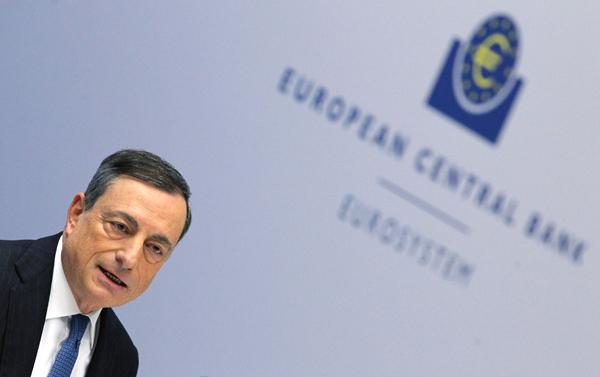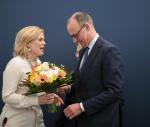You are here
European Central Bank disappoints markets with bare-minimum easing package
By Reuters - Dec 03,2015 - Last updated at Dec 03,2015

ECB President Mario Draghi addresses a press conference in Frankfurt am Main, western Germany, on Thursday (AFP photo)
FRANKFURT — The European Central Bank (ECB) eased policy further on Thursday to fight stubbornly low inflation but kept much of its powder dry, disappointing high market expectations for greater stimulus.
The ECB cut its deposit rate deeper into negative territory and extended its asset buys by six months, widely anticipated moves that some investors considered the bare minimum after the bank had for weeks stoked expectations of stimulus moves.
The bank will also start buying municipal debt but keep its overall asset purchases unchanged, potentially lowering its government bond buys as the new instrument crowds out other assets.
The euro jumped as much as 3.1 per cent against the dollar after the policy announcement and bond yields surged.
Disappointed investors had anticipated a 25 per cent increase in monthly asset buys, with some even pricing in a bolder deposit rate cut than the move to -0.3 per cent from -0.2 per cent.
The euro traded 2.4 per cent higher on the day at $1.0865 at 1510 GMT, on course for its biggest one-day gain since March.
Defending the moves, ECB President Mario Draghi said the market just needed to take time to understand them, adding they could always be adapted.
"I think these measures need time to be fully appreciated and we'll see," he told a news conference. "Our asset purchase programme is flexible, it can always be adjusted."
The huge foreign exchange market move actually tightens monetary conditions, effectively countering the ECB's easing by lowering imported inflation through a higher exchange rate.
Draghi damaged?
"The biggest danger is that market reaction may put the ECB in an awkward position," Nicholas Wall, portfolio manager at Invesco Fixed Income said.
"A large sell-off in bonds and a stronger euro will tighten financial conditions in Europe and make inflation even harder to generate; they may be talking about easing again sooner than they wished," Wall added.
Still, the euro remains 4 per cent weaker against the dollar since the last rate meeting, indicating that the easing stance has had some impact, even if much of it has been reversed.
The disappointment also damages Draghi's track record of promising and delivering big, first established with a pledge to "do whatever it takes" to defend the euro and bolstered with a bigger-than-expected quantitative easing (QE) earlier this year.
"The non-unanimity of the decision is important, and the market's disappointment is important for the future," Toby Nangle at asset manager Columbia Threadneedle said.
"It limits President Draghi's ability to guide markets who will naturally become more suspicious of his power to deliver the governing council," he added.
Bets on looser ECB policy, even as the US is expected to lift rates this month, has been a key factor driving the euro's weakness against the dollar.
Federal Reserve (Fed) Chair Janet Yellen said investors appeared to expect more from the ECB on Thursday.
"The market expected some actions that were not forthcoming," she told a congressional hearing in Washington.
Resistance to many of the measures under consideration by the ECB was evident after the 25-member governing council's two German members came out in opposition of any measures.
Bundesbank chief Jens Weidmann and executive board member Sabine Lautenschlaeger have both argued that monetary policy is already exceptionally loose, that growth is rebounding and the biggest reason inflation is hovering near zero is the fall in oil prices, a big boost for household spending.
Indeed, the ECB actually raised its 2017 gross domestic product (GDP) forecast and said the recovery, even if tepid and prone to geopolitical risk, was actually becoming more broad-based.
Fiscal loosening?
Arguing for monetary policy caution, some European governments are working on looser 2016 budgets, raising the prospect of loosening fiscal and monetary policy at the same time, for some a potentially dangerous combination.
"The ECB is acting against a backdrop of easier fiscal policy; across the eurozone, governments are quietly abandoning fiscal austerity," indicated David Tan, global head of rates at J.P. Morgan Asset Management.
He said France gave up the pretence of fiscal rectitude with successive delays to cutting its deficit while Italy's 2016 fiscal stance next year is also projected to be 0.7 per cent points of GDP looser than seen six months ago.
"Even Germany expects to miss its balanced budget target next year as it needs to spend to accommodate a refugee influx of around 900,000 in 2015 and 800,000 in 2016," Tan added.
The ECB is also facing seemingly inevitable rate hikes from the Fed with divergence between the world's biggest central banks keeping markets volatile
Although the ECB also said it decided to reinvest principal payments purchased under QE, the impact of the measures is not seen as significant in the short term as few assets are set to mature until March 2017.
"If we take QE purchases so far, less than 9 per cent were maturing in the two-year sector of the curve," Citigroup indicated. "If we take this as a reasonable amount of bonds, this would be reinvestment worth less than 60 billion euros."
Separately, top ECB officials will not meet market players within a week of policy decisions, Draghi said on Thursday, responding to criticism of closed-door meetings with hedge funds and banks.
The move represents an improvement in transparency for Europe's arguably most powerful institution, which critics say is also one of the continent's most opaque bodies.
It comes six months after a top ECB official revealed market-sensitive information at a closed-door hedge-fund dinner. That prompted the central bank to scrap the distribution of speeches to journalists under embargo.
Criticism resurged, however, after officials' diaries, published in response to a journalist's freedom of information request, showed that hedge funds and banks regularly met policy makers, even shortly before key decisions.
On Thursday, Draghi sought to draw a line under the controversy. In a letter to European lawmakers, he said that such meetings with the six-person executive board, at the core of decision making, would no longer happen at sensitive times.
"There is a need to avoid public speculation or any misperceptions about meetings between members of the executive board and the media and market participants," Draghi wrote to the member of the European Parliament.
"We have, therefore, decided ... that the members of the executive board will refrain from meeting or talking to the media, market participants or other outside interests on monetary policy matters during the quiet period, i.e. in the seven-day period prior to monetary policy meetings," he said.
The move brings the ECB into line with other central banks, such as the Bank of England, and should help satisfy critics, including the European Union's top watchdog.
Last week, European Ombudsman Emily O'Reilly had said she would appeal to Draghi to scrap such meetings ahead of setting policy, such as interest rates.
Others have also called for better accountability at the ECB, which sets the cost of eurozone borrowing, supervises banks and was part of the 'troika' involved in overhauling troubled eurozone states such as Greece.
In May, Benoit Coeure, an influential member of the ECB's executive board, told an audience including hedge funds about plans to accelerate bond buying.
The euro fell when it was announced to the public the following day and some investors cried foul. The ECB said the delayed publication of Coeure's speech was accidental.
ECB diaries later revealed Coeure met BNP Paribas in September 2014 just hours before the bank cut its deposit rate, increasing its charge on banks for parking money at the ECB.
Those diaries also showed that hedge funds Moore Capital and Bridgewater Associates are among regular visitors to the central bank.
Related Articles
FRANKFURT — European Central Bank (ECB) chief Mario Draghi unleashed a bold easing package on Thursday, cutting rates and expanding asset bu
The euro fell Friday against the dollar on growing expectation that the European Central Bank (ECB) will launch stimulus this week to jump-start the ailing eurozone economy.
FRANKFURT — The European Central Bank (ECB) cut its growth and inflation forecasts on Thursday, warning of possible further trouble from Chi















